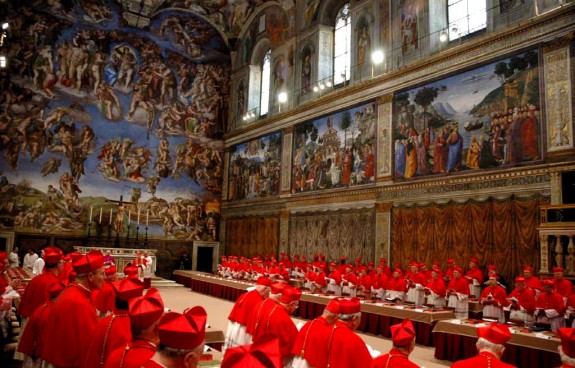After a year, L’Osservatore Romano has finally published in English the text of Cardinal Prosper Grech’s meditation, delivered to the 115 cardinals at the start of the conclave that elected Jorge Bergoglio to be the next pope.
He concludes:
Until now we have spoken about Popes, cardinals, bishops and priests, but there is another factor of hope in the Church that we must not pass over, the sensus fidelium. Augustine calls it “the interior Teacher” in each believer, and St John calls is “the anointing” that teaches us all things (1 Jn 2:20, 27). It creates in the depths of the heart that criterion for discerning what is true from what is false; it makes us distinguish instinctively what is secundum Deum from what comes from the world and from the Evil One (1 Jn 4:1-6). According to Dei Verbum 8, the sensus fidelium is also a locus theologicus which needs to be considered by the Church’s pastors. The embers of devout faith are kept alive by millions of simple faithful who are far from being called theologians, but who in the intimacy of their prayer, reflections and devotions can give deeply meaningful advice to their pastors. It is they who “will destroy the wisdom of the wise, and the cleverness of the clever, I will thwart” (1 Cor 1:19). This means that when the world with all of its knowledge and intelligence abandons the logos of human reason, the Logos of God shines forth in simple hearts that form the marrow from which the backbone of the Church is nourished.
But why am I saying this? It is because although we commonly profess that the Holy Spirit is the soul of the Church, we do not always take him into consideration in our plans for the Church. He transcends all sociological analysis and historical prediction. He goes beyond scandals, internal politics, ambition and social problems, which in their complexity obscure the face of Christ which must shine forth even through thick clouds. Let us listen to Augustine: “The Apostles saw Christ and believed in the Church that they did not see; we see the Church and must believe in Christ whom we do not see. By holding fast to what we see, we will arrive at seeing the One whom now we do not see” (Sermones 328, 3). And you, why are you here? In 1961 John XXIII received in audience, here in the Sistine Chapel, the Diplomatic Corps accredited to the Holy See. He pointed to the dominant figure of Christ the Judge in the fresco by Michelangelo, and told them that Christ will also judge the actions of the individual nations in history. You find yourselves in this same Chapel, beneath the figure of Christ with his hand raised not to crush but to illuminate your voting, that it may besecundum Spiritum, not secundum carnem, that is, Non in sinistrum nos ignorantia trahat, non favor inflectat, non acceptio muneris vel personae corrumpat. Thus the one who is elected will not only be yours, but will essentially be His.
I would like to conclude on a lighter note. This is not the first Conclave I have attended. I was also present at the conclave of Paul VI, as a simple sacristan who prepared the altars. One day Cardinal Montini came to me asking me to hear his confession; two hours later he was Pope. When he died, preparations were made for the Conclave, and there were three Cardinals, including Cardinal Luciani, who were staying at the Collegio Santa Monica. It fell to me, as the eldest, to greet them before their departure for the Sistine Chapel. I remember having said: “Saying ‘best wishes’ to you is not in good taste, saying ‘goodbye’ is even worse. I will only say: ‘May God bless you’”. I am a bird of good omen! I extend to you the same greeting: May the Lord be with you and bless you.












